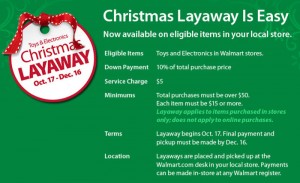Layaway: enabling people of questionable intelligence to pay more for stuff they can’t afford to begin with
Layaway. Once a popular method of making purchases in the dark days before credit cards and the internet, this relic from the past has been making a return in recent years. While several large retailers have always quietly maintained a layaway purchase option, a handful have started to actively promote it (most notably Kmart and Sears). The clearest sign of a comeback is Walmart’s resurrection of its layaway program, just in time for the 2011 holiday season — and much to the delight of the masses clamoring for the return of a Walmart layaway option since 2006 (as evidenced by the hundreds of thousands of signatures across several online petitions!). Layaway is, of course, idiotic.
For those of you that don’t know what layaway is, it’s sort of like an installment purchase plan. In an installment plan, you take your item home and then pay for it later, over the course of several payments on a predetermined schedule. The difference with a layaway plan is that you don’t take the item home until you’ve completely paid for it. Yes, you read that that correctly — with layaway, you give some of your money to the store today (usually along with an additional fee to initiate the layaway plan), and then a bit more next week, and so on until the item is completely paid for. Then, the store gives you the item. Apparently, there are people that find this an appealing way to pay for things.
I’m going to make a few assumptions about the people that take advantage of layaway: first, they can’t afford whatever it is that they’re buying (otherwise, they’d simply pay upfront, avoid the extra layaway fees, and take possession of the item immediately). Second, they either don’t have access to a credit card, or they believe layaway is a better option than credit cards. Finally, they’re really bad at basic math.
I’ll skip the lecture on the idiocy of buying things that you can’t afford, since here in America the accumulation of material things is of tantamount importance, even if it leaves you perpetually poor. However, for the people that believe layaway is a superior option to exorbitant credit card finance fees, think again. For example, let’s say that you decided to take advantage of Walmart’s program (click the image above for details) to layaway a $59 Playstation game in the middle of November. You would have handed over about $6 as a down payment, plus the $5 layaway fee, to initiate the plan. Over the next few weeks, you made several more payments, until finally on December 16th, you paid off the balance and took your game home. Congratulations, in the given example, that $5 layaway fee is the equivalent of charging the game to a 101.6% APR credit card (and you thought your card’s 15% APR was outrageous)! I only hope that you didn’t arrive at this realization after a few payments and try to cancel, because that $5 fee is non-refundable, and there is an additional $10 cancellation fee.
The policies at other major retailers are similarly terrible. Best Buy, for example, simply adds 5% to the purchase price to initiate an eight-week layaway plan. That is the same as taking out a loan with a 32% interest rate. Kmart offers a 12-week layaway with a non-refundable $10 service fee, and $20 cancellation fee.
Really, even if there were absolutely no additional fees associated with layaway, why would you ever volunteer to give your money to the store weeks (or months) in advance?

Recent Comments